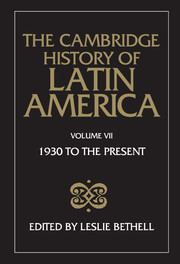6 - Honduras since 1930
from PART TWO - CENTRAL AMERICA
Published online by Cambridge University Press: 28 March 2008
Summary
In the first century after independence from Spain Honduras fought a mainly unsuccessful battle to overcome the constraints on national integration imposed by its geography. The country's high mountains and narrow, steep-sided valleys had crippled internal communications, inhibited agricultural development and produced a marked localism in national politics. In the late 1920s, the land frontiers with Guatemala, El Salvador and Nicaragua were all still in dispute, leading to occasional military conflict, while the lack of national integration encouraged neighbouring governments to intervene in Honduran affairs. Even the off-shore territories were subject to the same centrifugal tendencies; the Bay Islands, recovered from Great Britain in 1860, remained largely autonomous, sovereignty over the Swan Islands was disputed with the United States, and possession of several islands in the Gulf of Fonseca was contested with El Salvador and Nicaragua. The country's difficulties were compounded by the size of its population. The 1930 census estimated the number of inhabitants at 854,184, giving a population density of less than 20 per square mile. The overwhelming majority were scattered throughout the rural areas, leaving the capital Tegucigalpa with a mere 40,000 souls. Large areas of eastern Honduras were virtually uninhabited.
Geography had given a different twist in Honduras to the liberal reforms which swept Central America from the 1870s. While Liberal caudillos implemented and participated personally in programmes to foster coffee and other agro-exports in the neighbouring republics, in Honduras Presidents Marco Aurelio Soto (1876–83) and Luis Bográn (1883–90) emphasized mining, both becoming shareholders themselves in newly formed companies.
- Type
- Chapter
- Information
- The Cambridge History of Latin America , pp. 283 - 316Publisher: Cambridge University PressPrint publication year: 1990



